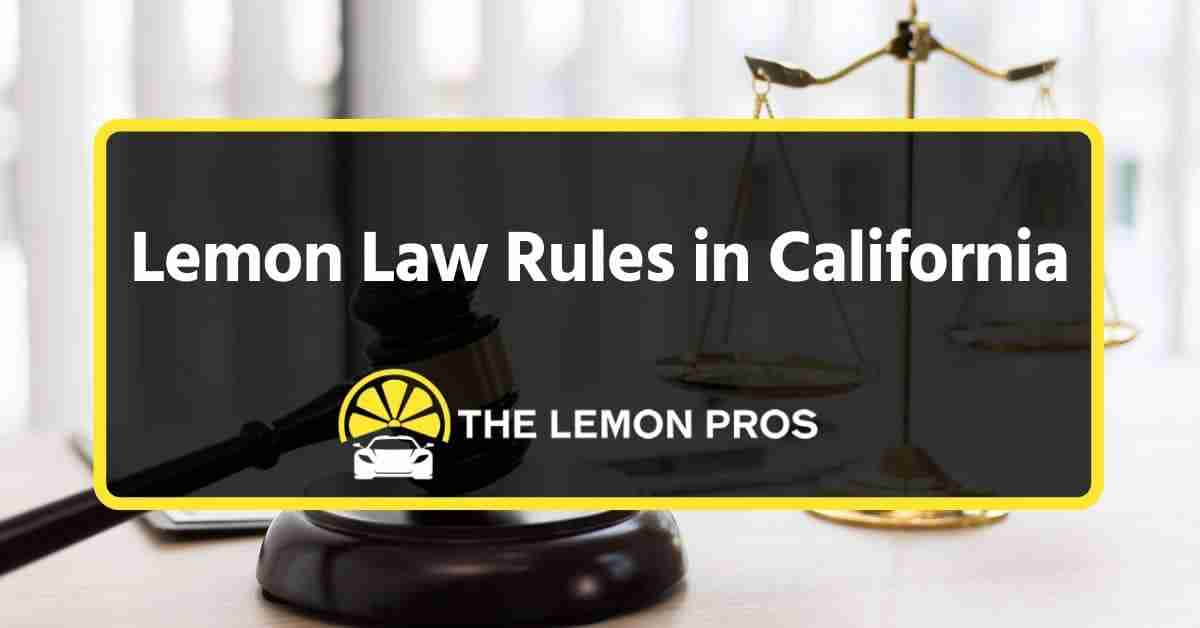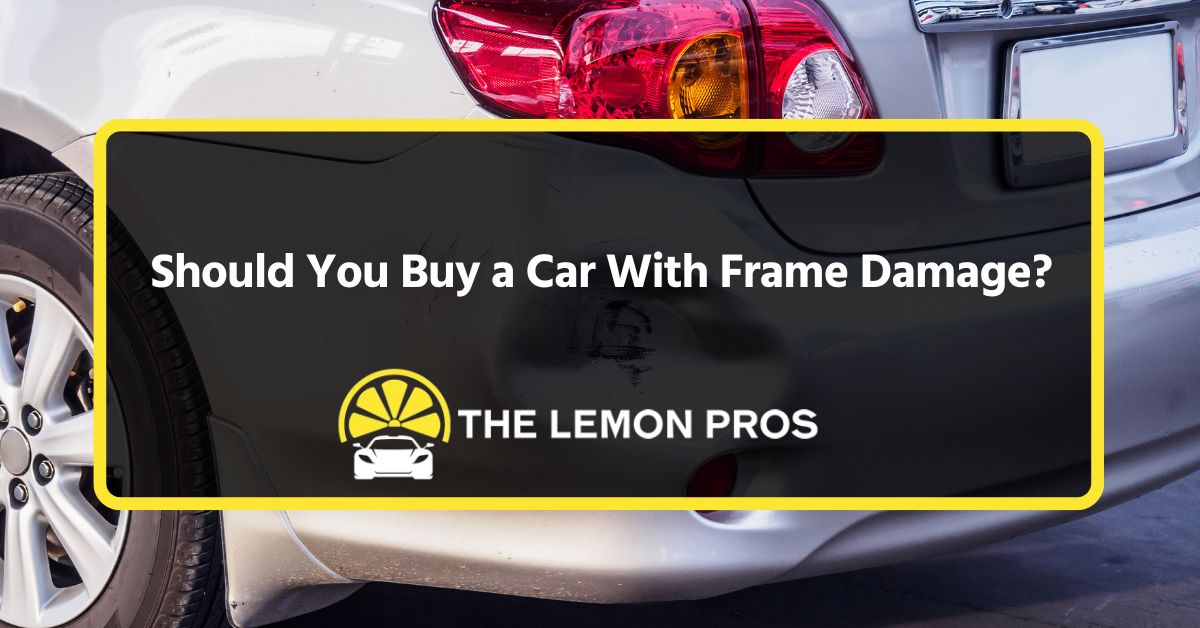
Should You Buy a Car With Frame Damage?
It’s natural to get excited about a car that’s priced great and looks good until you see those words “frame damage” on the vehicle history report. Considering that the frame is the part of the car holding everything together, it’s a concerning thought to know there’s any damage in that area.
You should only consider buying a car with frame damage if you understand what you are getting into. Frame damage may affect a car’s safety, value, and may lead to future repairs, so it's usually best to walk away from the deal.
The Lemon Pros see frame damage cases more often than you could imagine. With a practice area focused on cars, we know how fast a good deal turns into a nightmare with structural issues involved. If you’ve been the victim of fraud or had a dealer misrepresent the car’s condition, it’s time to contact us for a free consultation.
In this guide, we cover how frame damage occurs and show you whether these cars are a good idea in your situation. We also discuss why not all frame damage is covered under the Lemon Law and give you steps on what to do if you’ve been victimized.
Table Of Contents
- What Is Frame Damage in a Vehicle?
- Should You Buy a Used Car With Frame Damage?
- When Might It Be Okay to Buy a Car With Structural Damage?
- Is Frame Damage Covered by Lemon Law?
- Suspect You Bought a Lemon?
- FAQ
- Is Frame Damage a Deal Breaker When Buying a Car?
- Can a Car With Frame Damage Cause Safety Concerns?
- Will Insurance Cover a Car With Frame Damage?
- Do You Need to Disclose Frame Damage When Selling a Car?
- How Do You Know if Frame Damage Repairs Were Done Correctly?
- How to Know if a Car Has Frame Damage
- Does Frame Damage Affect the Car's Trade-In or Resale Value?
- Is the Car Totaled if It Has Frame Damage?
What Is Frame Damage in a Vehicle?
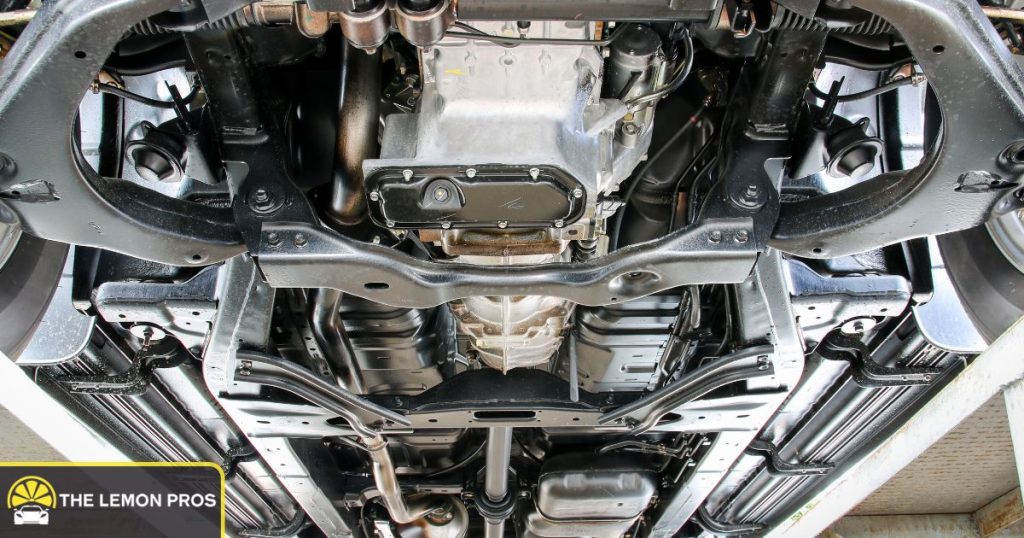
Most cars found today contain a unibody frame, meaning that the body and the frame are a single piece. Body-on-frame designs are found in older vehicles, bigger trucks, and some large SUVs. This body sits on top of a durable steel frame. When damage occurs to either unibody cars or vehicles with a body-on-frame, it’s a serious concern.
While frame damage isn’t considered one of the most common car problems, it occurs more frequently than expected. Typically, the damage comes from one of these causes:
- Accident – Even a low-speed crash can bend the car’s frame.
- Rust – Corrosion eats away at the metal, especially in locations with harsh winters and road salt.
- Poor repair – If a previous repair wasn’t performed correctly, the frame may not be durable and strong.
Frame damage can be spotted through a visual inspection of the car or on the vehicle history report, such as what’s provided by CARFAX. It could also be listed on the vehicle’s title as a branding.
Is It Safe to Drive a Car With Frame Damage?
Frame damage goes to the heart of safety. When the frame is cracked or bent, it weakens how the vehicle absorbs impact. In turn, there’s less protection if you are in an accident. Frame damage can also affect the alignment, making it harder to steer and control the car.
Sadly, not all frame damage is fixable. Some repairs may never be able to create the same level of strength and protection as the frame had when it was new.
This is where the California Lemon Law comes into play. If you’ve purchased a car with frame damage and it wasn’t disclosed to you or repaired properly, you may be due compensation.
Should You Buy a Used Car With Frame Damage?
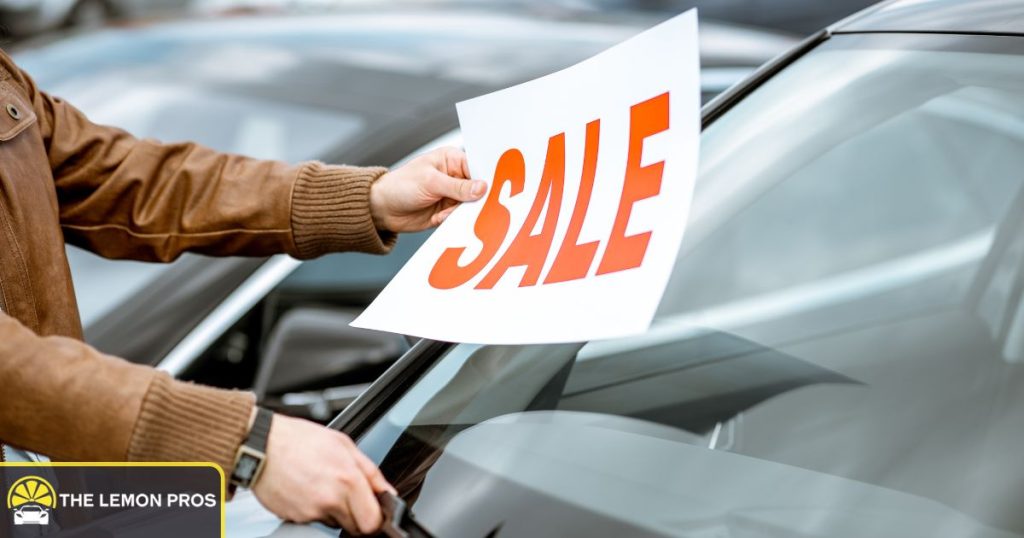
If you are considering buying a car with minor frame damage to save a few dollars, you may want to evaluate these points before making a decision.
Pros of Buying a Car With Frame Damage
The biggest benefit to buying a car with prior frame damage is the lower price. You can score a great deal on a car that’s been in an accident.
In some cases, the damage does not include weakened frames or major problems. You may simply be looking at cosmetic frame issues. In these cases, frame repair may not cost you as much.
If you need a parts car or are looking at taking on a project, the damaged car may offer a good alternative to spending more money. Uneven body panels and the structural integrity may not matter to you when looking for mechanical parts. However, you will have to consider the towing bill and expenses necessary to get the vehicle back to your home shop.
If you decide to buy a damaged car, it’s important to purchase from a reputable dealer that will disclose frame damage and other issues upfront. You have the right to know what you are getting into.
Cons of Buying a Car With Frame Damage
When the car’s structure is damaged, drivers are left with serious safety concerns. Not only may the car not protect occupants during a crash, but the vehicle may also not drive straight.
Repair costs can be pricey, and it can be difficult to find a professional mechanic who will take on the job. Even after frame damage repair, there could be serious safety risks associated with driving the car.
Potential resale value is going to drop, even if repairs have been performed. The lower price comes because of the risks associated with the damaged car.
Furthermore, you could have trouble getting collision coverage through an insurance company. If you are covered, the rates are going to be much higher. The same can be said about financing the car through a reputable provider.
What’s most alarming is that there could be hidden damage even after professional repairs are performed. It’s a risk you take when buying a car with frame damage.
When Might It Be Okay to Buy a Car With Structural Damage?
If you're a qualified mechanic and are comfortable with performing the frame damage repairs yourself, buying these cars may prove to be valuable. You could fix the damage and resell the car, but you need to make sure the repair records reflect the fix if you want to get decent money.
Additionally, if you need mechanical parts for a similar car, you could get a great deal on one that’s been damaged. Since you won’t be driving the car, you won’t have to worry about safety or the potential insurance challenges.
There are also times when it makes sense to buy a previously-repaired car. However, you only want it if the damaged frame is professionally repaired and everything has been well-documented. The vehicle should pass a comprehensive inspection before your purchase.
Is Frame Damage Covered by Lemon Law?
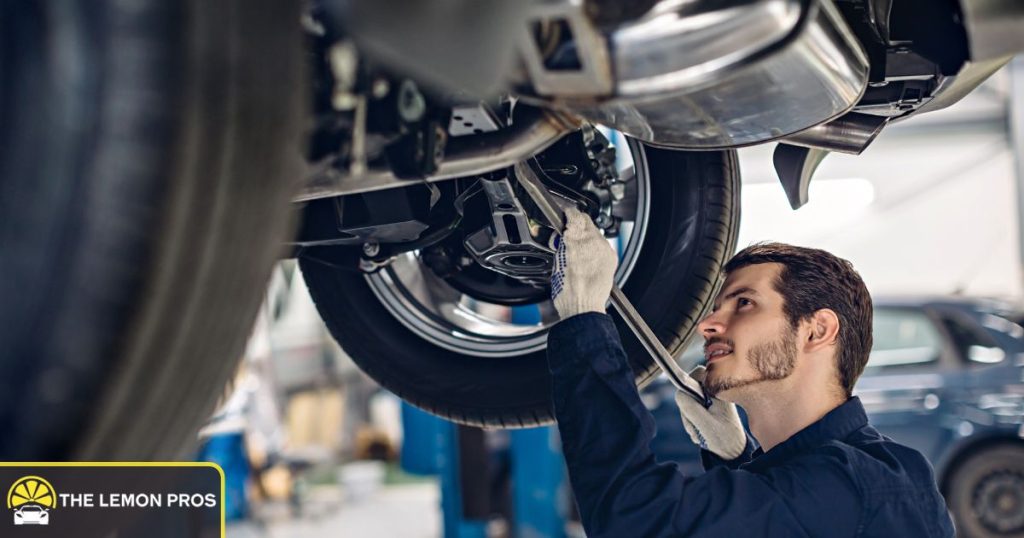
California’s Song-Beverly Consumer Warranty Act covers new cars that have substantial defects affecting the use, value, or safety of the vehicle. These stipulations include damage to the frame rails or structure of a car.
Most frame damage occurs because of an accident, making it a used car issue. While there are some regulations for used car Lemon Law, the vehicle would have needed to be sold by a reputable dealership and still be covered by the factory warranty to qualify.
Unless the frame damage came from the factory or was hidden during the sale, a Lemon Law case can’t typically be filed. However, you may have grounds to sue for fraud or misrepresentation, depending on the circumstances.
Exceptions Where Lemon Law Might Apply
Here are a few reasons why the Lemon Law could apply to your case.
- Frame damage was present at the time of the new vehicle sale
- The dealer sold a damaged car as new or Certified Pre-Owned without proper disclosures
- Manufacturer defects to the chassis or frame (rare)
Unfortunately, you can’t simply return your vehicle to the dealership for a refund. You must go through the proper channels of getting a buyback from the manufacturer or dealer. This is best performed with the help of a Lemon Law attorney.
Suspect You Bought a Lemon?
The structural foundation of the car is paramount to your safety on the road. Yes, you can get a good deal on a car with frame damage, but it may not be worth it in the long run. Not only does the car’s resale value plummet, but it may not withstand impacts the way it should if an accident occurs.
We encourage you to have a complete inspection of a car with structural damage before considering a purchase. A mechanic knows to look for uneven gaps, visible bending, and damage to the crumple zones that could jeopardize your safety. You can also check the branding of the title (salvage title) to see if the major damage has been disclosed.
If you have purchased a car with structural damage, you may have a case for The Lemon Pros. Our experience has allowed us to win millions of dollars in settlements for clients. Find us on Google and contact us today for a free consultation.
FAQ
We've provided answers to some of the more common inquiries people had regarding the purchase of cars with frame damage.
Is Frame Damage a Deal Breaker When Buying a Car?
Unless you are buying the car to take parts from it or you are qualified to repair it, even minor bends and damage to the frame should be reason to walk away from a sale. These cars can be dangerous in accidents and may be impossible to insure, making them more of a hassle than they are worth.
Can a Car With Frame Damage Cause Safety Concerns?
Yes! A bent or damaged frame can lead to issues driving in a straight line, requiring you to make more corrections while driving. It can also put you at risk during an accident if the frame doesn’t offer the support it needs to.
Will Insurance Cover a Car With Frame Damage?
Many buyers have trouble getting insurance for a frame-damaged car after buying it. Insurance companies simply don’t want to take the risk. Even when owners can find coverage, the cost is typically much higher than for a similar model without frame damage.
Do You Need to Disclose Frame Damage When Selling a Car?
If you are a dealership, you are required by law to disclose that there’s frame damage with any car you sell. As a private seller, you should still disclose the information. Selling the car as-is is a great way to protect yourself from liability, but you should still give the potential buyers notice of the problems that you are aware of.
How Do You Know if Frame Damage Repairs Were Done Correctly?
Start by asking for detailed documentation on the repair. The shop should have also performed a wheel alignment following the fix. Look at panel fitment to determine if everything lines up correctly. Additionally, pay attention to how the rear trunk and hood appear. Finally, take it for a test drive to make sure it stays straight. If you notice a pull to one side, the repair may not be adequate.
How to Know if a Car Has Frame Damage
It’s best to have the vehicle inspected by a qualified mechanic. Not only can the technician determine if the frame is in good shape, but they can also look at the other vital components, such as the engine and transmission. If the seller won’t let you have it inspected, this is a red flag warning, and you should consider buying elsewhere.
Does Frame Damage Affect the Car's Trade-In or Resale Value?
Yes, the vehicle’s resale value can be significantly lower if it has frame damage. Not only is it seen as potentially unsafe, but you may have trouble trading it in when you are ready to get a new car. While you may have to accept lower offers, it’s always best to disclose any damage you are aware of.
Is the Car Totaled if It Has Frame Damage?
The car is only considered a total loss if the insurance company deems that it’s too expensive to repair. Because frame damage is an expensive problem to fix, many of the cars end up totaled and/or with a branded salvage title to warn potential buyers.

